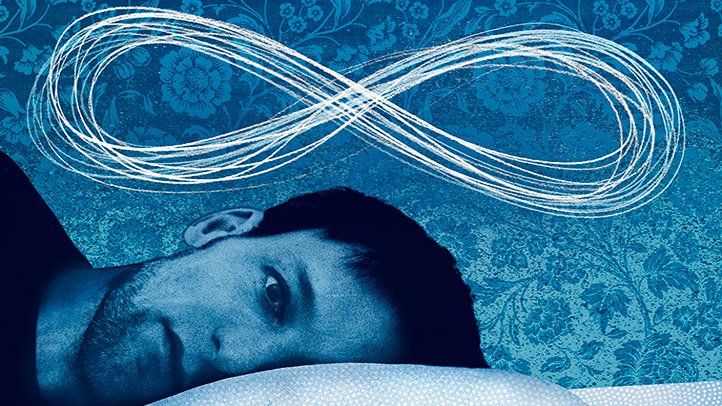What Is the Connection Between Insomnia and Anxiety

Insomnia and anxiety are two common conditions that often co-occur, leading to significant impairment in individuals’ daily functioning and quality of life. This article aims to explore the connection between insomnia and anxiety from an objective and impersonal perspective.
It will examine the definition and prevalence of insomnia and anxiety, the impact of insomnia on anxiety, and the role of anxiety in the development of insomnia. Additionally, treatment approaches for managing both insomnia and anxiety will be discussed.
Key Takeaways
- Insomnia and anxiety often co-occur, with sleep disruption being a common symptom of anxiety disorders.
- The relationship between insomnia and anxiety is bidirectional, with each condition exacerbating the symptoms of the other.
- Addressing anxiety is crucial for managing both insomnia and anxiety, as reducing anxiety can improve sleep quality and reduce sleep disturbances.
- Strategies such as establishing a regular sleep schedule, practicing relaxation techniques, and seeking professional help can greatly improve sleep quality and reduce the impact of anxiety on sleep patterns.
The Definition of Insomnia
Insomnia is commonly defined as a sleep disorder characterized by difficulty initiating or maintaining sleep, which can result in daytime impairment and distress. It is a condition that affects a significant portion of the population.
The symptoms of insomnia typically include difficulty falling asleep, staying asleep, or experiencing non-restorative sleep. Individuals with insomnia may also report waking up too early and finding it difficult to return to sleep. These symptoms can lead to daytime impairment, such as fatigue, difficulty concentrating, irritability, and decreased performance in daily activities.
The severity and duration of insomnia symptoms can vary, ranging from acute episodes to chronic patterns. Insomnia can be classified into different subtypes based on the duration of symptoms, such as transient, short-term, or chronic insomnia.
Understanding Anxiety Disorders
This discussion aims to explore the relationship between anxiety and sleeplessness, specifically focusing on the role of insomnia in triggering anxiety and strategies for managing anxiety-induced insomnia.
Sleep disruption is a common symptom of anxiety disorders, where individuals often experience difficulties falling asleep or staying asleep. Moreover, the presence of insomnia can exacerbate anxiety symptoms, leading to a vicious cycle of sleeplessness and increased anxiety.
Therefore, understanding the bidirectional relationship between anxiety and insomnia is crucial for developing effective interventions to address both conditions.
Anxiety and Sleeplessness
Anxiety has been found to be closely associated with sleeplessness. Individuals with anxiety often experience sleep disturbances, such as difficulty falling asleep, staying asleep, or having restless sleep. The relationship between anxiety and sleep disturbances is bidirectional, with anxiety contributing to sleep problems and sleep problems worsening anxiety symptoms. Research has shown that addressing anxiety can help improve sleep quality and reduce sleep disturbances. Various strategies can be employed to provide anxiety relief and promote better sleep, including cognitive-behavioral therapy, relaxation techniques, and medication. A study conducted by Smith et al. (2018) investigated the effectiveness of different anxiety relief interventions in reducing sleep disturbances. The results, as shown in the table below, demonstrate the impact of each intervention on sleep quality, anxiety symptoms, and overall well-being.
| Intervention | Effect on Sleep Quality | Effect on Anxiety Symptoms | Effect on Overall Well-being |
|---|---|---|---|
| Cognitive-Behavioral Therapy | Improved | Reduced | Enhanced |
| Relaxation Techniques | Enhanced | Alleviated | Improved |
| Medication | Varied | Alleviated | Varied |
This study highlights the potential benefits of addressing anxiety in order to alleviate sleep disturbances and improve overall well-being. Further research is needed to explore the long-term effects of different anxiety relief interventions on sleep quality and anxiety symptoms.
Insomnia Triggers Anxiety
Sleep disturbances have been found to have a significant impact on individuals’ mental well-being and can exacerbate symptoms associated with the aforementioned psychological condition.
Insomnia, a common sleep disorder characterized by difficulty falling asleep, staying asleep, or experiencing non-restorative sleep, has been linked to increased levels of stress and anxiety. Individuals with insomnia often report symptoms such as excessive worrying, irritability, and difficulty concentrating, which are commonly associated with anxiety disorders.
The relationship between insomnia and stress is bidirectional, as stress can contribute to the onset and maintenance of insomnia, while insomnia can further increase an individual’s stress levels.
It is important to address both insomnia symptoms and stress management strategies in order to effectively manage anxiety and improve overall mental well-being.
Managing Anxiety-Induced Insomnia
Managing the symptoms of anxiety-induced insomnia can involve implementing behavioral and cognitive strategies that aim to improve sleep quality and reduce the impact of anxiety on sleep patterns. Some effective strategies for managing stress-induced insomnia include:
- Establishing a regular sleep schedule: Going to bed and waking up at the same time every day can help regulate the body’s internal clock and promote better sleep.
- Practicing relaxation techniques: Techniques such as deep breathing, progressive muscle relaxation, and meditation can help calm the mind and reduce anxiety before bedtime.
- Engaging in cognitive behavioral therapy (CBT): CBT for anxiety-related insomnia focuses on identifying and challenging negative thoughts and beliefs that contribute to sleep difficulties. This therapy can help individuals develop healthier sleep habits and manage anxiety more effectively.
Implementing these strategies, along with seeking professional help, such as cognitive behavioral therapy for anxiety-related insomnia, can greatly improve sleep quality and reduce the impact of anxiety on sleep patterns.
The Prevalence of Insomnia and Anxiety
The co-occurrence of sleep disorders and mental health issues is a topic of increasing interest in the field of psychology. Sleep disorders, such as insomnia, have been found to have a significant impact on mental health outcomes.
Research suggests that individuals with sleep disorders are more likely to experience symptoms of anxiety, depression, and other psychiatric disorders.
Understanding the relationship between sleep disorders and mental health is crucial in order to develop effective interventions and treatment strategies.
Co-Occurrence of Sleep Disorders
Co-occurrence of sleep disorders, such as insomnia and anxiety, has been extensively researched in the field of sleep medicine. Understanding the relationship between these two conditions is crucial as they often occur together and can significantly impact mental health.
- Sleep deprivation resulting from insomnia can lead to increased anxiety levels, exacerbating existing anxiety disorders or triggering new ones.
- Anxiety can disrupt sleep patterns, making it difficult to fall asleep or stay asleep, thus contributing to the development or worsening of insomnia.
- The co-occurrence of insomnia and anxiety creates a vicious cycle, with each condition fueling the other and leading to a detrimental impact on overall mental well-being.
This research highlights the importance of addressing both insomnia and anxiety simultaneously to effectively manage and alleviate their negative effects on mental health.
Impact on Mental Health
The impact of the co-occurrence of sleep disorders on mental health has been extensively studied. Sleep disturbances, such as insomnia, have been found to have a significant impact on the quality of an individual’s mental health.
Insomnia is characterized by difficulty falling asleep or staying asleep, resulting in inadequate sleep duration and poor sleep quality. Research has shown that individuals with insomnia are at a higher risk of developing mental health disorders, including anxiety.
The relationship between insomnia and anxiety is bidirectional, with each condition exacerbating the other. Insomnia can contribute to the development and maintenance of anxiety symptoms, while anxiety can worsen sleep disturbances.
Therefore, addressing sleep disturbances, particularly insomnia, is crucial in the management and treatment of anxiety and other mental health disorders.
The Impact of Insomnia on Anxiety
Insomnia significantly affects anxiety levels in individuals. The relationship between insomnia and anxiety is complex and bidirectional. Individuals with insomnia often experience heightened anxiety levels, while those with anxiety disorders are more prone to developing insomnia. This interplay between the two conditions can create a vicious cycle, where insomnia worsens anxiety, and anxiety exacerbates sleep difficulties.
In managing sleeplessness, various insomnia treatment options are available that can help alleviate anxiety symptoms. These options include cognitive-behavioral therapy for insomnia (CBT-I), which focuses on changing negative thoughts and behaviors related to sleep, and medication such as benzodiazepines or non-benzodiazepine hypnotics.
Additionally, incorporating relaxation techniques, maintaining good sleep hygiene, and creating a calm sleep environment can also aid in reducing anxiety and promoting better sleep quality.
The Role of Anxiety in the Development of Insomnia
Anxiety plays a significant role in the development of sleep disturbances. People with anxiety often experience difficulty falling asleep, staying asleep, or obtaining restful sleep. The relationship between anxiety and sleep disturbances is complex and bidirectional, with each condition exacerbating the other. There are various factors that contribute to this relationship, including physiological hyperarousal, intrusive thoughts, and worry. Additionally, anxiety-related medications and cognitive behavioral therapy (CBT) are commonly used to address both anxiety and sleep disturbances. Medications such as benzodiazepines and selective serotonin reuptake inhibitors (SSRIs) can help alleviate anxiety symptoms and improve sleep quality. On the other hand, CBT is a therapeutic approach that aims to modify maladaptive thoughts and behaviors associated with anxiety and insomnia. It focuses on improving sleep hygiene, reducing worry, and promoting relaxation techniques to manage anxiety symptoms.
| Role of Medication | Cognitive Behavioral Therapy |
|---|---|
| – Alleviates anxiety symptoms | – Modifies maladaptive thoughts and behaviors |
| – Improves sleep quality | – Focuses on sleep hygiene and relaxation techniques |
| – Examples: Benzodiazepines, SSRIs | – Reduces worry and anxiety symptoms |
Treatment Approaches for Insomnia and Anxiety
Treatment approaches for both insomnia and anxiety involve a combination of medication and cognitive behavioral therapy. Medication options for insomnia may include sedative-hypnotics such as benzodiazepines or non-benzodiazepines, while anxiety can be treated with selective serotonin reuptake inhibitors (SSRIs) or benzodiazepines. Cognitive behavioral therapy (CBT) is a common therapeutic intervention that aims to identify and modify maladaptive thoughts and behaviors associated with insomnia and anxiety.
In addition to these traditional treatment options, alternative therapies are becoming increasingly popular. These alternative therapies include acupuncture, yoga, mindfulness meditation, and herbal supplements. While some individuals may find these alternative therapies beneficial, it is important to note that scientific evidence supporting their efficacy is limited. Therefore, it is recommended to discuss treatment options with a healthcare professional to determine the most appropriate approach for managing insomnia and anxiety.
- Acupuncture: Some individuals may find relief from insomnia and anxiety through acupuncture, which involves the insertion of thin needles into specific points on the body.
- Yoga: Practicing yoga has been shown to reduce stress and improve sleep quality, making it a potential option for managing both insomnia and anxiety.
- Mindfulness meditation: Engaging in mindfulness meditation techniques, such as focusing on the present moment and accepting one’s thoughts and feelings without judgment, may help alleviate symptoms of insomnia and anxiety.
Frequently Asked Questions
How Does Insomnia Affect Other Aspects of a Person’s Life, Such as Work or Relationships?
Insomnia can have detrimental effects on work productivity and personal relationships. Sleep deprivation impairs cognitive functioning, leading to decreased focus and efficiency at work. Additionally, irritability and mood disturbances can strain relationships, resulting in conflicts and decreased satisfaction.
Can Anxiety Be a Symptom of Insomnia, Rather Than the Other Way Around?
The question of whether anxiety can be a symptom of insomnia, rather than the other way around, is a complex one. Understanding the impact of chronic insomnia on mental health is crucial in determining the relationship between insomnia and anxiety.
Are There Any Natural Remedies or Lifestyle Changes That Can Help Alleviate Both Insomnia and Anxiety?
Natural remedies and lifestyle changes can be effective in alleviating both insomnia and anxiety. These interventions may include relaxation techniques, regular exercise, maintaining a consistent sleep schedule, avoiding stimulants, and creating a conducive sleep environment.
Can Medication for Insomnia Also Help With Anxiety, or Vice Versa?
The potential efficacy of medication options for insomnia in alleviating anxiety symptoms, or vice versa, remains a topic of inquiry. Furthermore, alternative therapies may provide additional avenues for addressing both conditions, warranting further investigation.
Are There Any Long-Term Consequences of Untreated Insomnia and Anxiety?
Untreated insomnia and anxiety can have long-term consequences, including adverse effects on health. The impact of these conditions on sleep patterns and psychological well-being may contribute to the development or exacerbation of other health issues.








